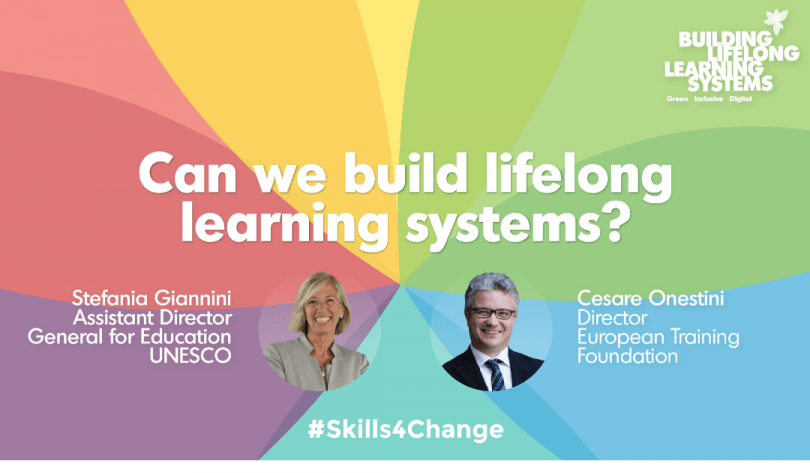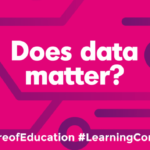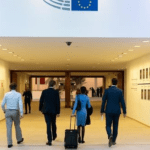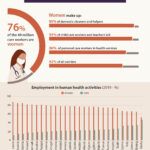From 21 to 25 June 2021, the ETF will be hosting a major online event in partnership with UNESCO and with the collaboration of the ILO, EBRD and UNICEF. Entitled “Building lifelong learning systems: skills for green and inclusive societies in the digital era“, the conference aims to track our progress in building sustainable education and training systems. On 11 June, the ETF Director, Cesare Onestini sat down – virtually – with UNESCO’s Assistant Director for Education, Stefania Giannini to introduce the event. The conversation exemplified the cooperative approach and affinity between the ETF and UNESCO.
We are living in unprecedented times. Digitisation, globalisation and environmental crisis are converging to transform every aspect of our lives, including how we learn and how we teach. The COVID-19 pandemic has accelerated the pace of that transformation, while amplifying existing inequalities. It is within this context that UNESCO has launched its Futures of Education initiative. The aim: catalysing a global debate on how knowledge, education and learning need to be reimagined in a world of increasing complexity, uncertainty and precarity.
At the ETF, we contribute to that shared goal, focusing on the need for learning systems that mesh better with markets and employment – and lifelong learning is the key to ensure that this process elevates everybody in society to achieve their full potential.
European Commissioner for Jobs and Social Rights, Nicolas Schmit, will join the conference to highlight the connection between the European Skills Agenda that he champions – supporting policy reforms in EU neighbourhood countries, notably through international cooperation – and the role of the ETF. In the context of the EU external action, we are working together to create a policy environment that makes learning meaningful, engaging and accessible for all. If we are going to build back better and greener, we need to change systems in line with a lifelong learning perspective.
The disruption of the pandemic has put public policy back in the spotlight. For many years now, debate has raged in the fields of education and training – and beyond – about the relative responsibilities of governments, public authorities, the private sector, public/private partnerships, and other actors. The pandemic has reminded us what a big difference public policy can make. We need to focus on that. Today, we have a once-in-a-lifetime opportunity to rebuild, reconstruct and rethink the policies that will enable us to rise to the challenges of the future. With its rich potential for transformation, education and training policy is one of the most powerful tools we have at our disposal.
The strategic importance of education is acknowledged in the UN’s Strategic Development Goal 4: “Ensure inclusive and equitable quality education and promote lifelong learning opportunities for all”. As we spoke, Stefania Giannini made a powerful point. SDG 4 is not simply one goal among others: it is the core of the system, the crosscutting dimension that will make it possible to achieve all the other 16 SDGs.
Here at the ETF, we share that vision. That is why we are already cooperating with UNESCO on such forward-thinking projects as Youth Employment in the Mediterranean – which aims to transform technical and vocational training in the region – and the Inter-Agency Group on Technical and Vocational Education and Training. Our institutions share the same commitment to quality education, skills development, gender equality and data connectivity. And we are both convinced that lifelong learning is the glue that holds all those diverse policy goals together.
That shared vision will underpin the conference that begins next week. For five days, stakeholders from around the world will come together to share best practice, and examine the game-changing initiatives that are already up-and-running today – initiatives that include the ETF’s programmes in Georgia, Serbia and Uzbekistan, to name but three. We will explore the broader understanding that is emerging around lifelong learning, focused on delivering education and training to people where and when they need it – not trying to get people into education. Above all, we hope to foster a conversation about how we translate that into policies, and what needs to come next.
The event will bring all the major international stakeholders together to take stock and ensure we are heading in the same direction. As the ETF Director described in the Facebook Live, the ETF and its partners from other international organisations are coming together “in the same car, looking at the dashboard, and out of the window, and asking if we are heading in the right direction”.







Leave a Reply